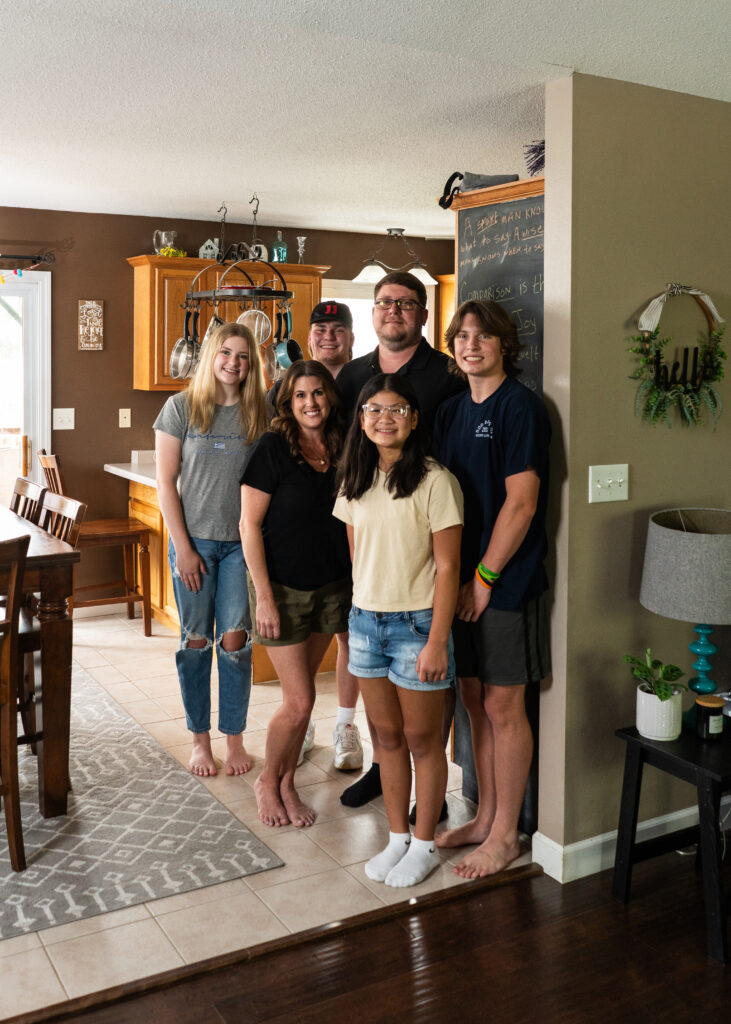Babies start out blank, clean, new, and parents get to be the ones who expose them to whatever they will know and how they will know it. Like teachers teach who they are, parents parent who they are as their children’s first teachers, passing along bits of themselves and the lessons they’ve learned throughout this journey we call life.
Here, meet three families doing this: the Schaitels, who have three children they adopted after being foster parents for six years; the Youngs, who have six biological children; and the Mayhews, who have four children, their youngest adopted from China. As they tell their stories, the parents share their parenting philosophies, and the family members share the things they learn from each other.
We hope their experiences, perspectives and wisdom they’ve learned along the way encourage you in your own being with your family, whomever that includes and whatever that looks like for you.
Heather and Mark Mayhew began dating when they were 15 years old, and six years later, they got married. Heather says they knew they always wanted to have children, and that they wanted to have more kids than the average household.
While pregnant and giving birth to their three biological children — Mason, now 19; Marlee, now 17; and Maksim, now 15 — Heather experienced difficult births, having C-sections with each child due to placenta previa, a condition in which the placenta covers the opening of the cervix. She says she and Mark knew they weren’t finished growing their family, and they wanted to adopt; these health concerns solidified that desire.
In college, Heather had taken a class during which she learned about China’s one-child policy, a policy in China from 1979 to 2016 that restricted women from giving birth to more than one child and imposed fines and other penalties upon families who violated the policy. She says she felt like “God put that on [her] heart” then; through research on adoption, talking with others who had adopted and prayer, she and Mark decided to adopt a child from China.
So, they began a year-and-a-half to two-year process of international adoption from China to bring their youngest daughter — Maeryn, now 11 — home to their family. Heather says the process was a costly, “very daunting” “paperwork pregnancy” that included many steps backwards when paperwork was incorrect or China changed the guidelines. When this happened, the Mayhews had to fill out, notarize and authenticate additional paperwork.
“It was pretty frustrating, the actual process,” Heather says. “It was a lot harder than it should be. But all worth it in the end.”
After the adoption process was complete, Heather and Mark traveled to China for 16 days in order to bring Maeryn to their home in Jackson. Heather says their international adoption agency, All God’s Children International, recommended “cocooning” after Maeryn came home, a time period at the start of the adopted child living with their new family during which the family takes a pause at home together, limiting their outside activities to focus on establishing trust and connection as a family unit.
Heather had previously been interested in homeschooling her children, and this seemed like the right time to try it out: She began homeschooling her other children and continued for the next 10 years, until each child went to high school. This past year, Maeryn decided she wanted to attend middle school, so she also stopped homeschooling. Heather says she appreciates the quality time they were able to spend together as a family due to homeschool.
One of the hallmarks of Heather and Mark’s parenting philosophy is open communication with their children. Heather and Mark apologize to their children when they are wrong and explain the reason behind why they are asking their children to do or to not do something. The way they communicate with their children has also changed with the evolution of technology: They say sometimes, instead of yelling across the house, they text their children a question or to let them know it’s time for dinner.
Overall, Heather and Mark want their children to know they have a voice in their relationships.
“We talk a lot about assuming. We tell them, ‘Your mom and I are pretty intelligent-ish, and we can kind of pick up on things, but please don’t ever assume we know what you’re thinking about a situation or how you’re feeling about something, because everyone’s all got their own stuff going on,’” Mark says. “‘We come together as a unit and as a group in this house, but everybody has work and school and their own concerns with boyfriends or girlfriends. We all have our own unique lived experiences every day, so help us out [by telling us how you feel].’”
As their children have gotten older, Heather and Mark say they have become more relaxed as parents, partly because they see their oldest children turned out well, and partly because they are older themselves and “more tired,” Heather jokes. When their children were young, Heather says they focused on discipline and consistency, which she says was worth it, because now that their children are pre-teens, teenagers and young adults, they can focus on having fun together.
Parenting, Heather says, is a learning process.
“We always tell our oldest Mason, ‘We’ve never parented a 19-year-old before. You’re our first one, so we’re going to make mistakes, and you’re the guinea pig, ‘cause you’re the oldest,’” Heather says. “It’s evolving, and it’s a work in progress. We’re still learning it.”
From her parents, Maeryn says she learns about love.
“I learn that they’ll love you no matter what,” Maeryn says. “No matter what mistake, they’ll love you, because you’re family, and you always will be, no matter what.”


